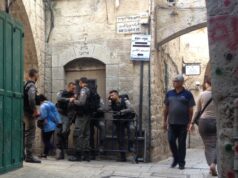Hundreds of Lebanese soldiers supported by armored vehicles deployed Tuesday inside Tripoli to end three days of deadly fighting between the rival neighborhoods of Bab al-Tabbaneh and Jabal Mohsen — the former’s residents are mostly Sunni and oppose Syrian President Bashar al-Asad, while the latter’s mostly hail from the minority Alawite sect and back the embattled leader. The fighting left at least seven people dead and nearly 100 wounded.
The gunfight began late Saturday following the arrest of Sunni Islamist, and outspoken Asad critic, Shadi Mawlawi after he was lured to the finance minister’s office under the pretext that he would be granted $500 to help his hospitalized daughter. According to Mawlawi’s lawyer, his client’s arrest is illegal. “In my opinion, [Mawlawi] was abducted by a [certain] party to be [executed], but when the [word of his arrest got out], General Security changed the case and covered up for it by taking [certain] legal procedure.” One can only assume that party is Hezbollah. Mawlawi is charged with “belonging to an armed terrorist group“; his supporters claim he was arrested for helping Syrian refugees.

Sunni gunmen stand on Syria Street, which divides the Sunni and Alawite areas in northern Tripoli, Lebanon. (Photo: AP/Hussein Malla) |
Thousands of anti-Asad Syrian activists seeking refuge have settled in Tripoli since the start of Syria’s uprising over one year ago. Due to the extra pressure, violence inside the city has occasionally flared along sectarian lines, with the recent round of fighting being the deadliest and involving hardline Sunni Islamists, or Salafists, for the first time. As of Tuesday evening, the fighting in Tripoli had been controlled by the Lebanese army, but unrest in the city is expected to continue given its newfound importance as a hub of support for the Syrian opposition — to the chagrin of the pro-Syria, Hezbollah-dominated Lebanese government. “Tripoli has become an essential backer of the revolution in terms of money, weapons and helping refugees and there is a desire to stop this,” Sheikh Nabil al-Rahim, a local cleric, told AFP.
The longer the fighting in Syria continues, the worse the situation is for local Syrians and the Lebanese. U.S. analysts are growing concerned, for example, of a potential infiltration of al-Qaeda militants into Syria. But without strong U.S. support for the Syrian opposition designed to remove Asad from power and end the bloodshed, what happens in Syria isn’t bound to remain in Syria. This includes a continued spillover of unrest into fragile Lebanon and beyond.





